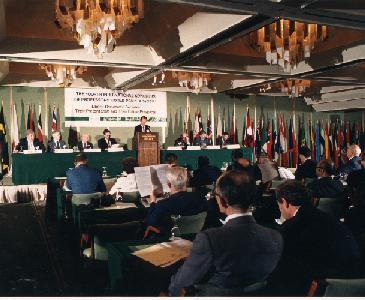
The Opening Convocation of the Fourth International
Congress of Professors
World Peace Academy (From Left to Right) The Honorable
Robert H. Bork, J.M.
Olin Scholar in Legal Studies, American Enterprise
Institute; Gordon L.
Anderson, Secretary-General, PWPA-International;
Edward Shils, Professor of
Social Thought, Cambridge University and University
of Chicago; Neil A.
Salonen, Vice Chairman, PWPA; Chung Hwan Kwak, Chairman,
PWPA; Morton A.
Kaplan, President PWPA-International; Roger Michener,
Professor of Law,
Princeton University; and J.C.H. Davies, President
of PWPA-UK.
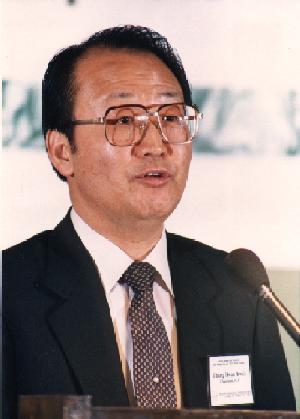
Reverend Chung Hwan Kwak, Chairman, International
Cultural Foundation.
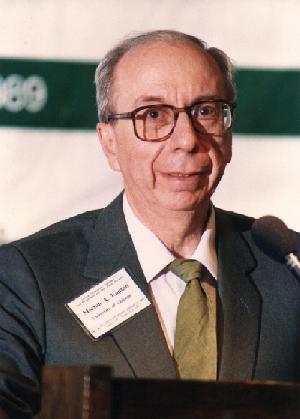
Morton A. Kaplan, President, PWPA-International.
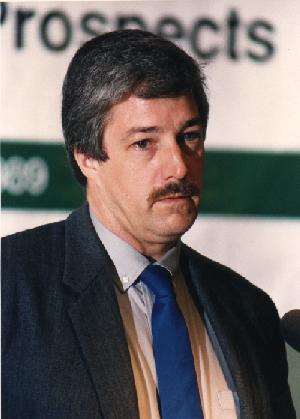
Roger Michener, Professor of Law, Princeton University,
Organizing Chairman
for the Fourth Congress.
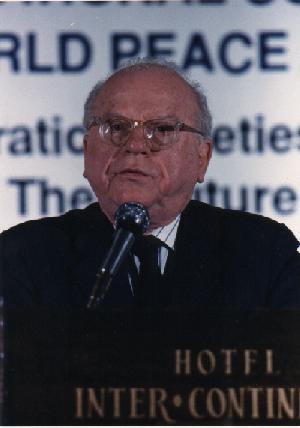
Edward Shils, Professor of Social Thought, the University
of Chicago and
Princeton University. Senior Consultant for the
Fourth Congress.
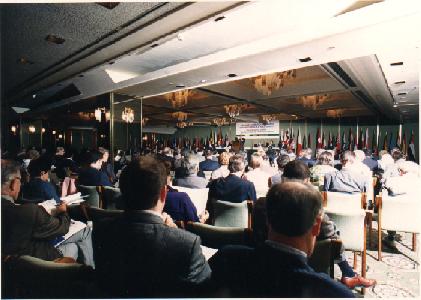
Reverend Kwak delivered his opening address to over
300 participants in the
4th International Congress of PWPA.
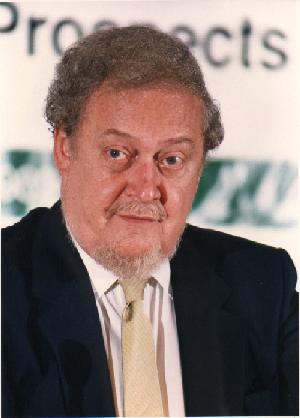
The Honorable Robert H. Bork, John M. Olin Scholar
in Legal Studies,
American Enterprise Institute
[photo A8]
Professor Shils delivering his closing Plenary address
at the Fourth
International Congress of PWPA on "The Present State
and Future Prospects
of Liberal Democracy."
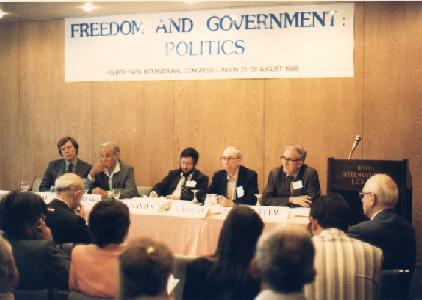
PANEL I - Freedom and Government: Politics
Within the liberal
democratic societies, government by the people and
for the people is constrained by the requirement
that the rights and
freedoms of individuals shall be respected. Tensions
have arisen in such
societies today and may be exacerbated tomorrow
because of the greatly
enhanced power of the modern state which some see
as a necessary response
to a variety of crises and legitimate demands and
others as the product of
the excessive material and ideological promises
made by politicians to those
whose support they seek. A further political issue
that has arisen concerns
the many independent social institutions that stand
between the state and
the individual which may become attenuated and lose
their autonomy as state
power increases and demands for individual "liberation"
grow. Liberal
democratic societies are dynamic and creative
entities characterized by
spontaneous change and in consequence the problems
their citizens face as
well as the opportunities they enjoy also change
so that the central
principles of ordered liberty will always have to
be applied in new and
unpredictable contexts. - J.C.H. Davies, University
of Reading.
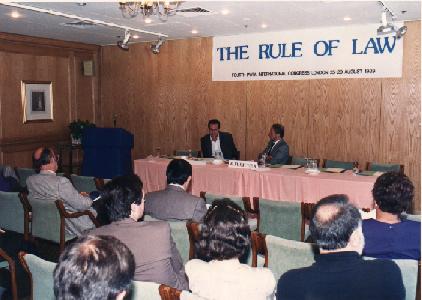
PANEL II - The Rule of Law and the Development of
Legal Institutions
Laypeople seem to
understand what they mean by the rule of law, but
lawyers and philosophers are engaged in making some
sense of this concept
that democratic liberals take for granted. This
panel will pursue this
inquiry into the foundations of the rule of law,
with papers on the
philosophical links between the concept and both
English and German
liberalism. The meaning of the rule of law is pursued
in the presentations
on the relationship of this ideal to formalism,
on the one hand, and
emotions, on the other. Underlying these themes
is the recurrent question
whether the rule of law should be understood in
its positivistic or
naturalistic variation - George P. Fletcher
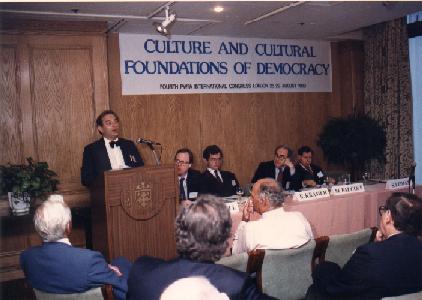
PANEL III - Culture and the Cultural Foundations
of Democracy
It is the purpose
of this panel to explore both the role of high
culture in liberal democratic society and the erosion
which that role has
lately suffered under the impact of political and
social developments that
look upon the traditions of high culture as an "elitist"
and thus oppressive
residue of an earlier and outmoded stage of our
civilization. What the
concept of "high culture" encompasses in this discussion
are the fine arts
and the humanities as traditionally understood in
the West.
Attention will be paid to
the way this concept of culture has been
altered by the political mission of the social sciences,
and the effect of
this altered meaning on education, the arts, and
indeed all of intellectual
life. Attention will also be paid to the adversarial
role of writers and
intellectuals in liberal democratic society.
Finally, the panel
will assess the impact of recent developments on the
institutions of high culture--art museums, the theater,
opera houses, and
the performance of classical music, book publishing,
etc.--which have
traditonally served to preserve and transmit the
central achievements of our
civilization but which now find themselves pressed
to perform quite
different functions. - Hilton Kramer, The New Criterion
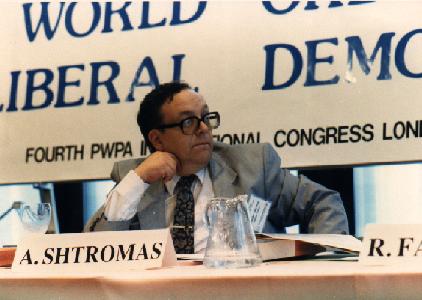
PANEL V - World Order and Liberal Democracy
The purpose of this
panel is to explore the possibility
of creating a liberal democratic world order. First,
the
suitability of liberal democratic principles to
provide the
foundation for the unification of different extant
civilizations and cultures into a universal world
order will
be examined. Then the current trends in international
politics
will be analyzed with the view to evaluate the practical
prospects for establishing a liberal democratic
world order.
The panel will also focus on the problem of the
applicability
of liberal democratic principles to management of
supra-
national and global affairs and, specifically, on
the
compatibility of an institutionalized world order
with the
right of nations to self-determination and sovereignty.
The
panel will conclude with the debate on the plan
for advancing
West European unity in 1992 and the global implications
of this
plan. - Alexander Shtromas, Hillsdale College
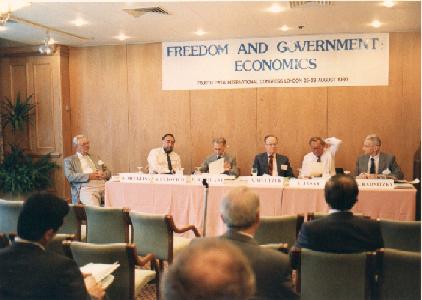
PANEL VI - Freedom and Government II: Economics
This panel considers
the different aspects of the relation
between freedom, coercion and the rights of individuals.
The
appeal of freedom arises both from the values it
creates or
preserves for the individual and the benefits it
may produce
for society. The conflicts between freedom and other
values may
arise when governments promise to provide "justice."
Cross
cultural comparisons of social arrangements with
differing
degrees of freedom provide evidence on the consequences
of
restricting freedom.
A common definition
of freedom is the absence of coercion.
This definition may mix freedom and power, and it
does not
consider sufficiently the relation between rights
and freedom.
Maintenance of freedom requires care about the assignment
of rights. Some rights are exclusive; others are not. The
definition of freedom that is discussed distinguishes
between
these different types of rights and the ways in
which they may
be assigned.
Few societies achieve,
or seek to achieve, strict limits
on coercion. The panel will consider the appeal
of liberal
democratic government and the reasons that such
governments
are now rare or non-existent. - Alan H. Meltzer,
Carnegie-
Mellon University and American Enterprise Institute
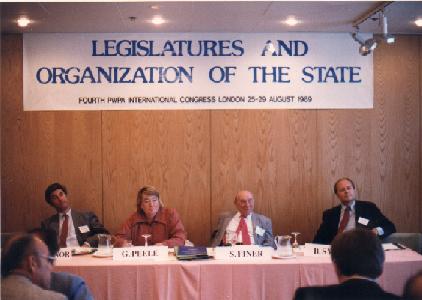
PANEL VII - Legislatures, Machinery of Legislation,
Organization of the State
This panel will discuss
the evolution of the liberal state
as a specific form of government. It will show how
the type of
representative government which we now see as the
model of the
liberal state was the product of a particular culture
and
historical period. One focus of the panel will be
on the extent
to which the model of the liberal state has had
to be modified
and adapted to cope with different historical circumstances
and
with different cultural expectations from those
in which it
emerged.
The panel will also
discuss the challenges to the liberal
democratic state in the twentieth century, especially
the
challenge inherent in the growth of state functions
and the
growing interdependence of nations. In the context
of the
modern state, can the legislative process be anything
other
than a ritual which leaves the real decision-making
power and
influence to other actors at the national and supra-national
level--officials, executive agencies and ministers,
and
pressure groups? This theme will be considered with
particular
reference to the style of democracy of the European
Community.
The growth of bureaucracy
and its development within
modern society will be considered from a number
of angles. Have
the institutions proved adequate? Is it possible
to control
bureaucracy? Does the strengthening of liberal democracy
require a strengthening of the market and governmental
decentralization?
Such questions will,
we hope, illuminate the relationship
between the evolution of governmental processes
and the
survival of liberal democracy between the machinery
of a
particular state or cluster of states and the value
of the
political system. - Gillian Peele, University of
Oxford
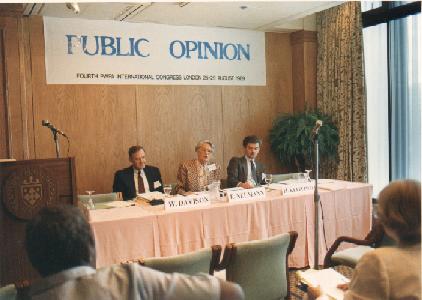
PANEL VIII - Public Opinion: Enlightenment
and Formation
This panel deals with
the effects of the mass media. Since
the thirties up to the present, this has been the
most
controversial field of communications research.
In the days of Aristotle it was already known that appearance is more important
than the actual nature of things. And how something
appears,
is largely a question of how it is presented in
the mass media.
This is the central issue when debating the effects
of the mass
media.
Over the past five
decades communications research has
been revolutionized. Initially concerned with the
effects
individual articles, films, or radio broadcasts
may have on the
public communications research now extends to the
study of the
complete media system, i.e., the interrelated effects
of
television, radio and the print media on public
opinion. The
knowledge as to what is really meant by public opinion
and its
role in society had been completely buried. It first
had to be
recovered and defined before the effects of the
mass media
could be understood and empirically investigated.
All the scientists
of this panel have made pioneering
contributions to this development of communications
research
over the past decades. - Elisabeth Nouelle-Neumann,
Institut
fur Demoskopie
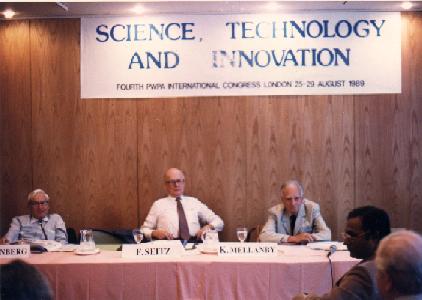
PANEL IX - Science, Technology, and Innovation
Science and modern
liberal democracy arose simultaneously.
Is this coincidence, or is the underlying ethic
postulated by
John Locke necessary for the flourishing of both
science and
liberal democracy? The great post World War II successes
of
science and technology have been confined predominantly
to the
liberal democracies. Yet the very openness of the
democracies
has, in recent years, begun to threaten scientific
inquiry
(animal rights, for example), and has hampered the
use of
technologies (pesticides, nuclear power) that are
regarded by
certain groups as environmentally threatening. Thus
we ask, can
hazardous technologies survive in open democracies?
The
converse question, can open democracies retain their
stability
in an age of instant worldwide communication and
sophisticated
terrorist gadgetry, is also timely, especially as
we witness
instabilities in Eastern Europe in this period of
transition
to democracy. - Alvin M. Weinberg, Oak Ridge
Associated
Universities
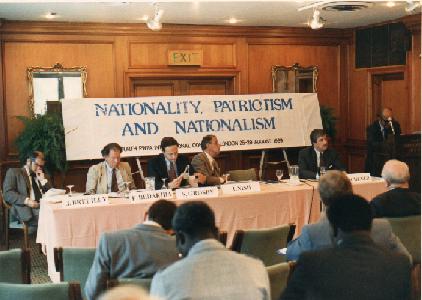
PANEL X - Nationality, Patriotism, & Nationalism
Since the French Revolution,
the nation-state has come to
be considered the normal form of political organization
of
liberal democratic societies, and many argue that
there will
be no durability of political systems if they lack
a specific
naional identity. However, we observe a progressive
erosion of
the original liberal connotations associated with
the notions
of nation and nationality, ultra-nationalism, fascism,
and the rise of high imperialism since the 1880's. In addition, the
nation-state turned against national minorities
within its own
boundaries.
By 1945 it seemed
evident to many that the ideas of nation
and nationality had come to the end of their usefulness.
However, the expectation that new transnational
forms of
political organization were about to take over proved
premature. Right now everywhere, even in the USSR,
old
nationality conflicts may well endanger the stability
of the
present world order and world peace. The new non-Western
nations were not spared any of the distortions of
the idea of
nationality which were already observed in 19th
century Europe.
Presently, in the
West the nationality problem is posed
in terms of the minority status of groups of immigrants
and
"guestworkers" and their offspring. Their numbers
now threaten
the dominant national culture and rightist movements
surface
making these groups their target. This challenge
strikes at the
heart of the liberal nature of Western democracies.
- Roger
Michener, Princeton University
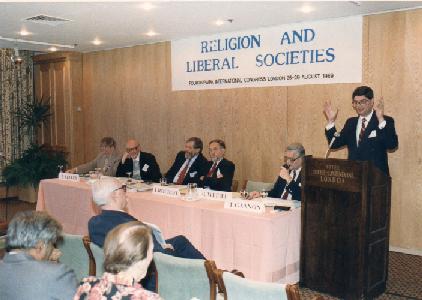
PANEL XI - Religion & Liberal Society
What should be the
legitimate role of religious groups in
a free society? To what extent do they, as the moral
conscience
of a society, have an obligation to speak out on
the crucial
issues affecting government and officials elected
to govern?
Should church and state remain separated or are
new kinds of
coalitions and allegiances inevitable? Liberal democracy
challgnes all religions to live with one another
in a
relationship of parity. Religion challenges democracy
to
respect puralism and to take into account transcendent
human
values. This panel will address these questions
from the
perpective of different religious faiths and different
national
experiences, paying particular attention to the
shifting
balance between those who would seek to transform
secularity
into secularism or change the religious role into
religiously
dominated discourse. - The Reverend Thomas M. Gannon,
S. J.,
Loyola University of Chicago
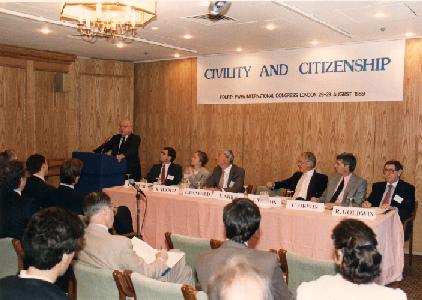
PANEL XII - Civility and Citizenship
The topic is developed
in six papers. The first by Edward
Shils distinguishes the "civil person" and the "civil
society"
from the "citizen" and the "state" and points to
conditions of
modern life that threaten to erode civility and
endanger
liberal democracy. The second paper by Katherine
Auspitz tells
how certain British and continental writers in the
eighteenth
and nineteenth centuries sought to encourage the
motivations
they deemed essential to a free society. The third
paper by
Charles Kesler describes the American founders'
conception of the public interest. The fourth paper by Robert Goldwin,
a
further examination of the American experience,
maintains that
the tension between rights and citizenship render
liberal
democracy impossible except as civility intervenes.
The fifth
paper by James Q. WIlson asks how we can explain
the fact that
nowadays economic progress is accompanied by increased
criminality; after a critical survey of the literature
on crime
he suggested that ultural changes reflect the logical
consequences of the Enlightenment. The sixth and
final paper
by Clifford Orwin views the subject matter in the
contrasting
lights of ancient and modern philosophy. - Edward
C.Banfield,
Harvard University
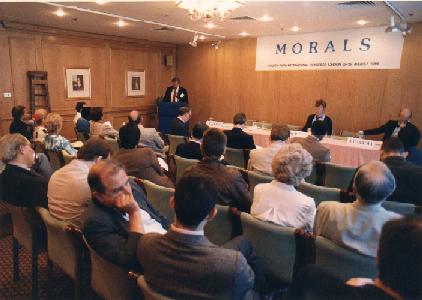
PANEL XIII - Morals
The kinds of questions
to be considered are these: to what
extent do the institutions of a liberal society
rest on moral
values, and to what extent are those values sustained
or
corroded by the liberal democratic way of life?
Is it possible
to distinguish liberty from license? Can there be
a liberal
sexual morality? To what extent is the liberal-democratic
order
compatible with the idea of a 'moral community'?
What place is
there for moral education in a liberal democratic
society? And
one could reflect here on the new 'ideologies' of
education of
the kind studied by Isabelle Stal and Francoise
Thom in Schools
for Barbarians. - Roger Scruton, University of London
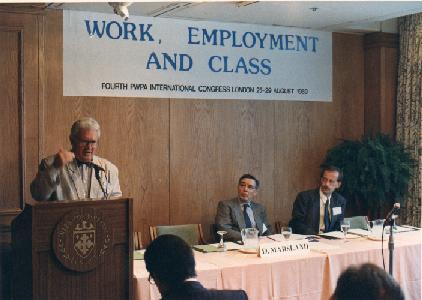
PANEL XIV - Work, Employment, and Class
Few aspects of liberal
democratic society are so crucial
to its future prospects as the organisation of work,
including
in particular the nature of recruitment to work
roles and their
rewards. The context of the panel's discussions
is provided by
the profound failure of marxist and related class
theories to
explicate the relations between work and society.
- David
Marsland, West London Institute
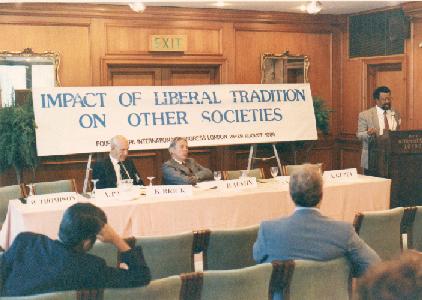
PANEL XIV - The Expansion and Impact of the Western
Liberal
Tradition on Other Civilizations
Over the past decade
the demand for democracy has posed
a challenge to a number of illiberal regimes. In
Eastern Europe
and the Soviet Union glasnost and perestroika are
powerful
symbols of hope if not as yet of achievement. There
is
evidence, too, of more liberal policies in several
Third World
states although problems of ethnic unrest, military
ambition,
failing economies, and the intensity of religious
fervour are
powerful obstacles to the success of democratic
beliefs.
The question is not
only whether people want democracy
but whether they can sustain the condition in which
political
freedom and civil liberties can be established.
The panel also
examines the question whether the movement of politics
towards
a greater degree of freedom should be measured in
relation to
local constraints and local achievements rather
than in
absolute terms.
The theme is large,
the range of examples very wide, from
Japan to India to the Soviet Union and the partial
democracies
of (some) Asian, African and Latin American countries.
The
unifying thread of enquiry is that of the title,
namely, the
extent to which the non-western world has been influenced
by
the liberal democratic values of the West. - Dennis
Austin,
University of Manchester
?
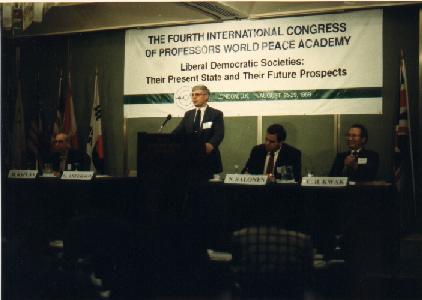
Dr. Gordon Anderson, Secretary-General of PWPA International
moderated the
PWPA-Presidents Plenary.
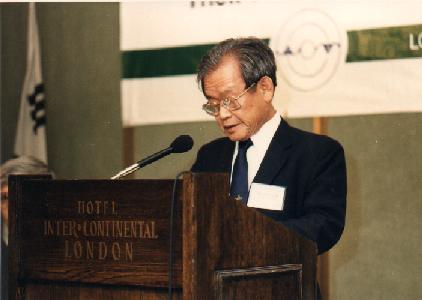
Dr. Hang Nyong Lee, President of PWPA-Korea, spoke
about PWPA activities in
Korea and Asia.
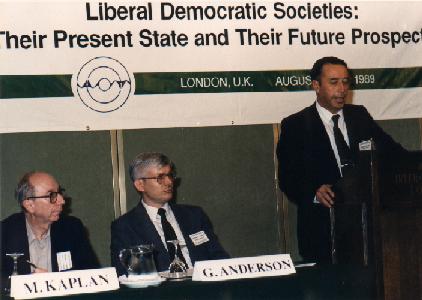
Professor Guido Pincheira, University of Chile and
President of PWPA-Child,
describes the activities of PWPA in Latin America.
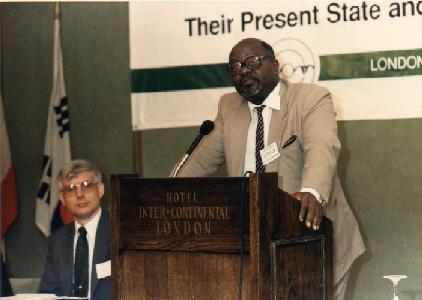
Professor G. Edward Njock, University of Yaounde,
Cameroon and Organizing
Chairman of the 2nd Pan-African Congress of PWPA,
described the development
of PWPA in Africa.
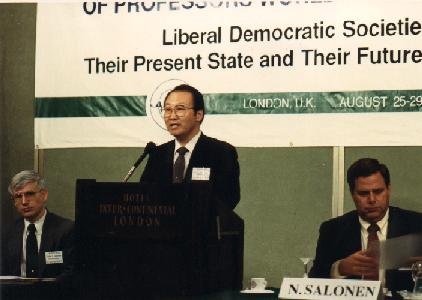
Reverend Chung Hwan Kwak unveiling Reverend Moon's
plan for the "New World
Festival" to PWPA Presidents.
[C6]
New World Festival Brochure.
[photo C7]
Latin American President's Meeting.
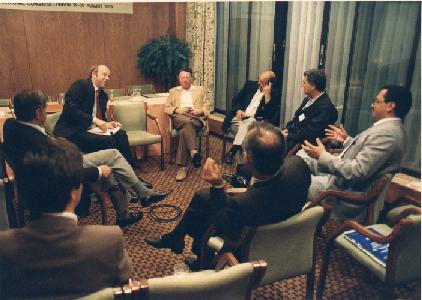
PWPA professors from the Middle East discuss plans
to reduce tension in the
region.
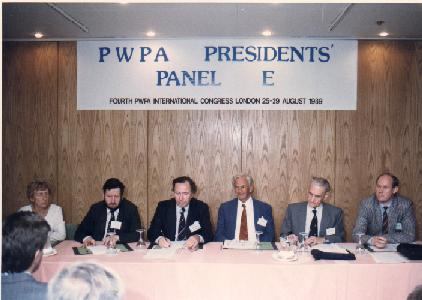
European Presidents meeting. New representatives
from Poland, Hungary, and
Bulgaria were present.
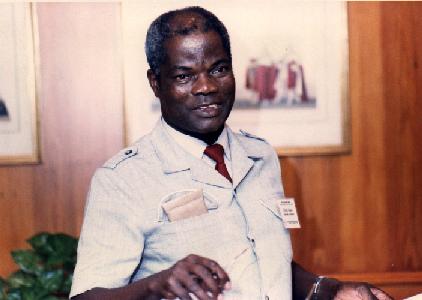
Professor Ogutu, President of PWPA-Kenya making
a point at the African
Presidents panel.
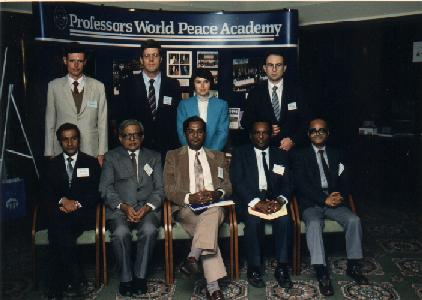
PWPA Leaders from South Asia posed for a photo by
a PWPA display.
Statement on Nationalism (Original with Today's
World)
? [photo D1]
Reverend Kwak welcomes W.T. Roy, President of PWPA-New
Zealand.
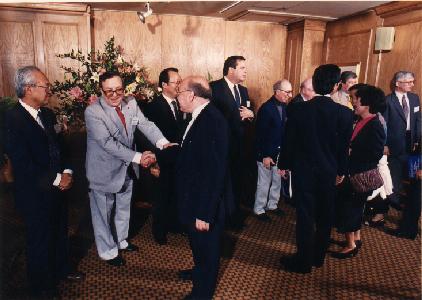
Alexander Shtromas, Organizing Chairman for the
2nd Congress, welcomes Sir
Alfred Shuman, Co-Founder of the Centre for Policy
Studies, U.K.
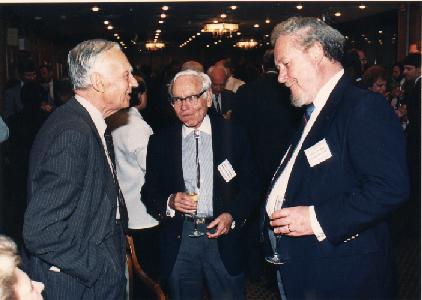
Judge Bork meets with long time ICF associates Kenneth
Mellanby and Alvin
Weinberg.
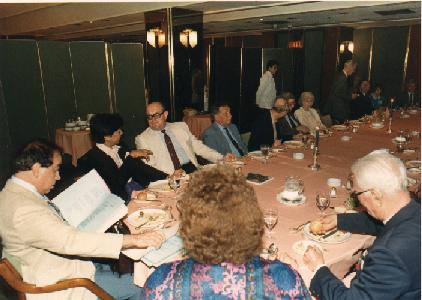
A meeting of the advisory board of the International
Journal on World Peace.
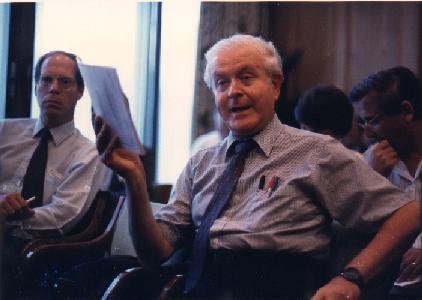
Professor Fred Singer makes a point in the session
on Inventiveness,
Discovery, and Technology.
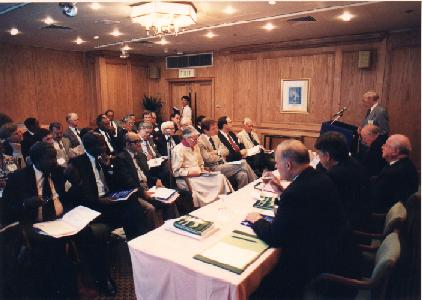
Walter Ruegg's Panel on Universities and Learning
was well attended.
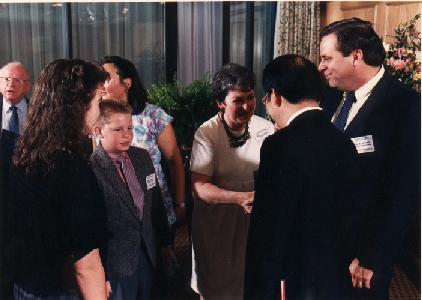
Mr. Salonen introduces his family to Reverend Kwak.
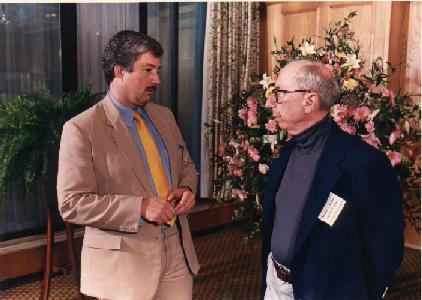
Professors Kaplan and Michener conferring before
the conference began.
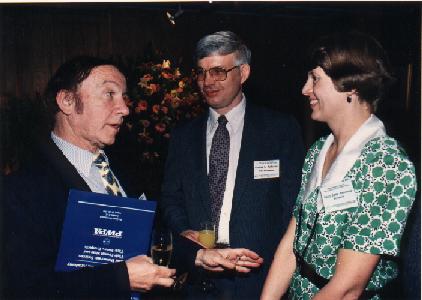
Professor Kittrie, President of PWPA in discussion
with Gordon Anderson,
Secretary-General, and his wife Mary Jane.
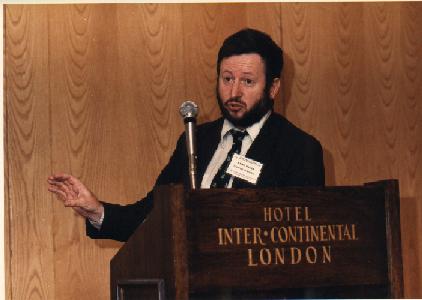
J.C.H. Davies, Professor of Sociology, University
of Reading, U.K., and
President of PWPA-UK, introduces the panel on Freedom
and Government which
he chaired.
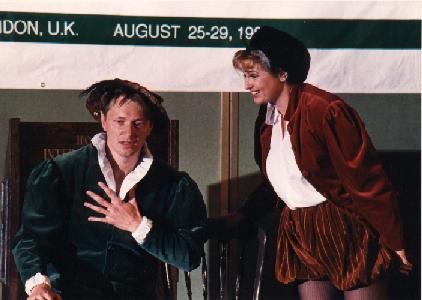
Shakespearian actors performed skits at the final
banquet.
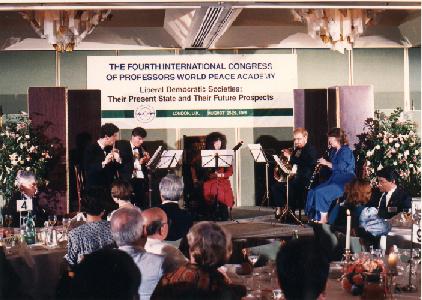
The Final Banquet ended with pleasant music from
a local wind quintet.








































